
Harry Manders is a fictional character in the popular series of Raffles stories by E. W. Hornung. He is the faithful companion of A. J. Raffles, a cricketer and gentleman thief, who makes a living robbing the rich in late Victorian British High Society.

The Black Mask is the second collection of stories written by Ernest William Hornung in the A. J. Raffles series concerning a gentleman thief in late Victorian London. It was first published in 1901.

"A Jubilee Present" is a short story by E. W. Hornung, and features the gentleman thief A. J. Raffles, and his companion and biographer, Bunny Manders. The story was first published in Scribner's Magazine in February 1901. The story was also included as the second story in the collection The Black Mask, published by Grant Richards in London, and Charles Scribner's Sons in New York, both in 1901.

"The Criminologists' Club" is a short story by E. W. Hornung, and features the gentleman thief A. J. Raffles, and his companion and biographer, Bunny Manders. The story was published in March 1905 by Collier's Weekly in New York, and in April 1905 by Pall Mall Magazine in London. It was also included as the fourth story in the collection A Thief in the Night, published by Chatto & Windus in London, and Charles Scribner's Sons in New York, both in 1905.
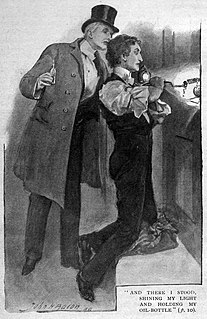
Arthur J. Raffles is a fictional character created in 1898 by E. W. Hornung, brother-in-law to Sir Arthur Conan Doyle, the creator of Sherlock Holmes. Raffles is, in many ways, a deliberate inversion of Holmes – he is a "gentleman thief", living at the Albany, a prestigious address in London, playing cricket as a gentleman for the Gentlemen of England and supporting himself by carrying out ingenious burglaries. He is called the "Amateur Cracksman", and often, at first, differentiates between himself and the "professors" – professional criminals from the lower classes.
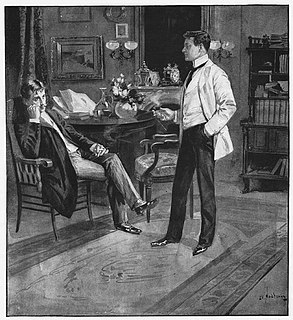
"The Ides of March" is a short story by E. W. Hornung, and the first appearance of the gentleman thief A. J. Raffles, and his companion and biographer, Bunny Manders. The story was first published in June 1898 by Cassell's Magazine. The story was also included in the collection The Amateur Cracksman, published by Methuen & Co. Ltd in London, and Charles Scribner's Sons in New York, both in 1899.

"A Costume Piece" is a short story by E. W. Hornung, and features the gentleman thief A. J. Raffles, and his companion and biographer, Bunny Manders. The story was first published in July 1898 by Cassell's Magazine. The story was also included in the collection The Amateur Cracksman, published by Methuen & Co. Ltd in London, and Charles Scribner's Sons in New York, both in 1899.
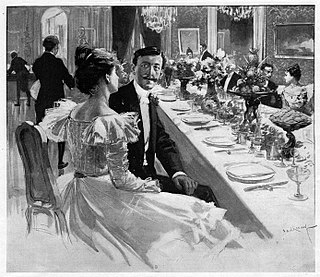
"Gentlemen and Players" is a short story by E. W. Hornung, and features the gentleman thief A. J. Raffles, and his companion and biographer, Bunny Manders. The story was first published in August 1898 by Cassell's Magazine. The story was also included in the collection The Amateur Cracksman, published by Methuen & Co. Ltd in London, and Charles Scribner's Sons in New York, both in 1899.

"Le Premier Pas" is a short story by E. W. Hornung, and features the gentleman thief A. J. Raffles, and his companion and biographer, Bunny Manders. The story was first published as the fourth story in the collection The Amateur Cracksman, published by Methuen & Co. Ltd in London, and Charles Scribner's Sons in New York, both in 1899. This and "Wilful Murder" were the two stories in the collection not published previously in magazine format.

"Nine Points of the Law" is a short story by E. W. Hornung, and features the gentleman thief A. J. Raffles, and his companion and biographer, Bunny Manders. The story was first published in September 1898 by Cassell's Magazine. The story was also included as the six story in the collection The Amateur Cracksman, published by Methuen & Co. Ltd in London, and Charles Scribner's Sons in New York, both in 1899.

"The Return Match" is a short story by E. W. Hornung, and features the gentleman thief A. J. Raffles, and his companion and biographer, Bunny Manders. The story was first published in October 1898 by Cassell's Magazine. The story was also included as the seventh story in the collection The Amateur Cracksman, published by Methuen & Co. Ltd in London, and Charles Scribner's Sons in New York, both in 1899.

"No Sinecure" is a short story by E. W. Hornung, and features the gentleman thief A. J. Raffles, and his companion and biographer, Bunny Manders. The story was first published in Scribner's Magazine in January 1901. The story was also included as the first story in the collection The Black Mask, published by Grant Richards in London, and Charles Scribner's Sons in New York, both in 1901.
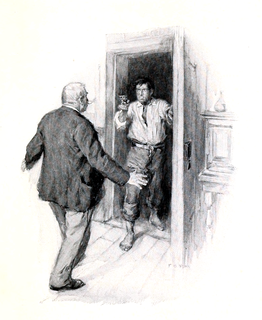
"The Fate of Faustina" is a short story by E. W. Hornung, and features the gentleman thief A. J. Raffles, and his companion and biographer, Bunny Manders. The story was first published in Scribner's Magazine in March 1901. The story was also included as the third story in the collection The Black Mask, published by Grant Richards in London, and Charles Scribner's Sons in New York, both in 1901.
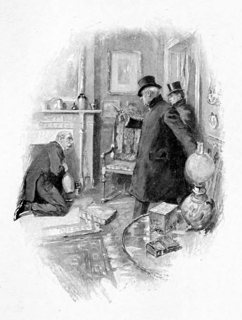
"To Catch a Thief" is a short story by E. W. Hornung, and features the gentleman thief A. J. Raffles, and his companion and biographer, Bunny Manders. The story was first published in Scribner's Magazine in May 1901. The story was also included as the fifth story in the collection The Black Mask, published by Grant Richards in London, and Charles Scribner's Sons in New York, both in 1901.

"An Old Flame" is a short story by E. W. Hornung, and features the gentleman thief A. J. Raffles, and his companion and biographer, Bunny Manders. The story was first published in Scribner's Magazine in June 1901. The story was also included as the sixth story in the collection The Black Mask, published by Grant Richards in London, and Charles Scribner's Sons in New York, both in 1901.

"The Wrong House" is a short story by E. W. Hornung, and features the gentleman thief A. J. Raffles, and his companion and biographer, Bunny Manders. The story was first published in Scribner's Magazine in September 1901. The story was also included as the seventh story in the collection The Black Mask, published by Grant Richards in London, and Charles Scribner's Sons in New York, both in 1901.
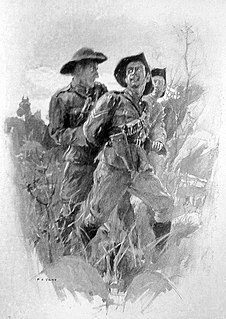
"The Knees of the Gods" is a short story by E. W. Hornung, and features the gentleman thief A. J. Raffles, and his companion and biographer, Bunny Manders. The story was first published as the eighth and final story in the collection The Black Mask, published by Grant Richards in London, and Charles Scribner's Sons in New York, both in 1901. It is the only story in the collection that was not first published separately in serial format.

"Out of Paradise" is a short story by E. W. Hornung, and features the gentleman thief A. J. Raffles, and his companion and biographer, Bunny Manders. The story was first published in December 1904 by Collier's Weekly in New York, and in January 1905 by Pall Mall Magazine in London. The story was also included as the first story in the collection A Thief in the Night, published by Chatto & Windus in London, and Charles Scribner's Sons in New York, both in 1905.

"The Rest Cure" is a short story by E. W. Hornung, and features the gentleman thief A. J. Raffles, and his companion and biographer, Bunny Manders. The story was published in February 1905 by Collier's Weekly in New York and in March 1905 by Pall Mall Magazine in London. The story was also included as the third story in the collection A Thief in the Night, published by Chatto & Windus in London, and Charles Scribner's Sons in New York, both in 1905.

"A Bad Night" is a short story by E. W. Hornung, and features the gentleman thief A. J. Raffles, and his companion and biographer, Bunny Manders. The story was published in June 1905 by Pall Mall Magazine in London. The story was also included as the sixth story in the collection A Thief in the Night, published by Chatto & Windus in London, and Charles Scribner's Sons in New York, both in 1905.




















